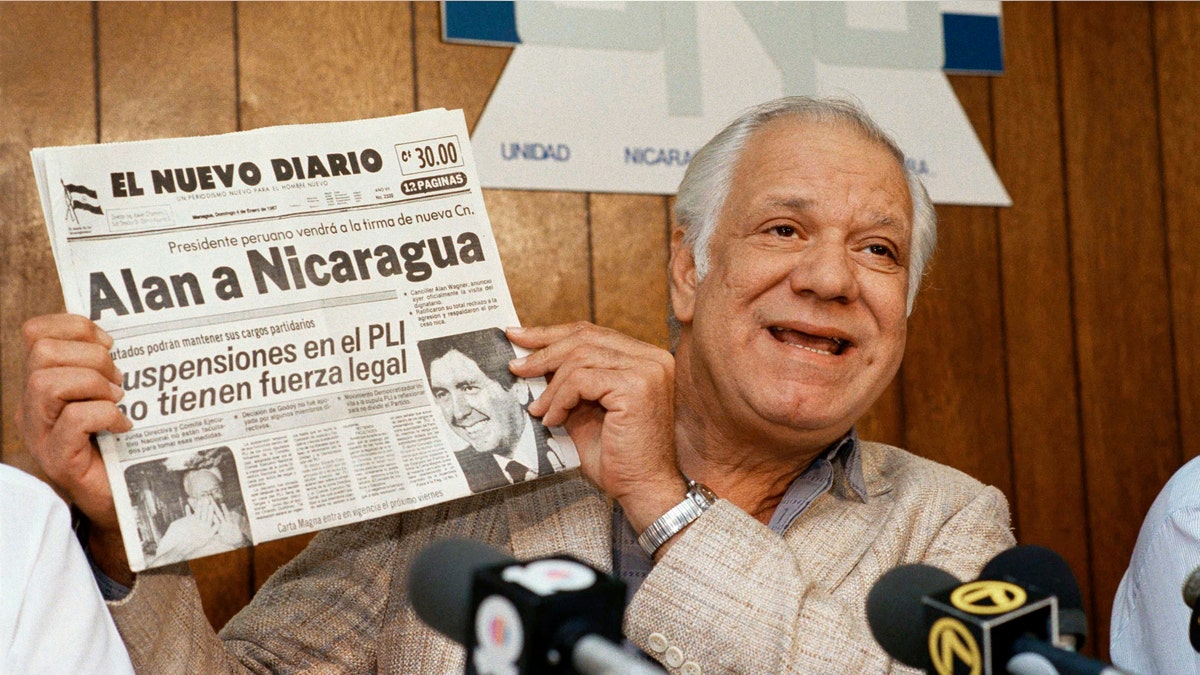
Contra leader Adolfo Calero holds a copy of Nicaraguan newspaper El Nuevo Diario during a news conference in Miami on Jan. 7, 1987. (AP Photo/Doug Jennings, File) (AP1987)
Adolfo Calero, one of the main leaders of the U.S.-backed rebels against Nicaragua's leftwing Sandinista government in the 1980s who became entangled in the Iran-Contra scandal, has died at age 81.
Calero died Saturday of lung problems in the Nicaraguan capital of Managua, his aide Julio Romero confirmed on Sunday.
As leader of the Nicaraguan Democratic Force, Calero helped pressure the Marxist Sandinistas toward the elections that pushed them from power in 1990.
He also was the key contact with senior U.S. officials during the Iran-Contra affair, when Reagan administration officials secretly arranged the sale of weapons to Iran to finance the Central American rebels, bypassing Congressional restrictions.
Calero attended the University of Notre Dame in Indiana and told a U.S. congressional committee in 1987 the experience awakened him to the value of freedom.
He said he returned home in the mid-1950s as "a knight in democratic armor, in my own country," opposing first the right-wing Somoza dictatorship that ruled Nicaragua for 43 years and later the leftist Sandinistas, who ousted the Somozas in 1979 with broad public support.
"When Somoza was driven from our country, we had a right to expect that our dreams of democracy would be fulfilled. Instead, we got the Soviet totalitarian regime, an oppressive dictatorship operated by the Soviet Union and its proxy, Cuba."
Calero was a prominent figure in Nicaragua's Conservative Party and worked against Anastasio Somoza, even meeting in 1978 with Sandinista leaders to overcome differences in the struggle against the dictator.
But when the Sandinistas pulled the government sharply left, Calero, who had headed the local Coca Cola bottling company, went into exile in Florida.
By 1983, he emerged as the political head of the Nicaraguan Democratic Force, the largest of the Contra groups, organized with U.S. aid.
The conflict killed thousands and added to economic chaos in the country. It eventually led to international mediation and the Sandinistas agreed to accept free elections if the Contras demobilized. The resulting vote removed the Sandinistas from power in 1990, though another election returned Sandinista leader Daniel Ortega to the presidency in 2007.
Calero denied knowing that any funds donated to the rebels had come from the Iranian weapons sales, but acknowledged in 1987 that three former U.S. military officers had helped them buy more than $18 million in military equipment at a time when direct U.S. arms aid was suspended. Another $14 million in donations were used to buy food, clothing and other supplies, he said.
Some of that money was turned into travelers checks and he told congressional investigators that he had given then-White House aide Oliver North about $90,000 of that to help in the liberation of U.S. hostages in Lebanon.
"I used to tell Col. North, frankly, everything. I had no reservation. I had full confidence and trust in him," Calero testified.
After the Sandinistas left power, Calero returned to Nicaragua, recovering the home the leftist rulers had confiscated from him, and practiced law.
Conservative U.S. Congressman Mario Diaz-Balart of Florida issued a statement of condolences on Saturday, calling Calero "the symbol of a country struggling to regain its freedom."
Calero was being buried Sunday in Managua.
Based on reporting by the Associated Press.
Follow us on twitter.com/foxnewslatino
Like us at facebook.com/foxnewslatino




















